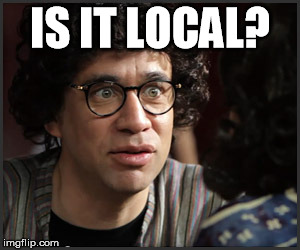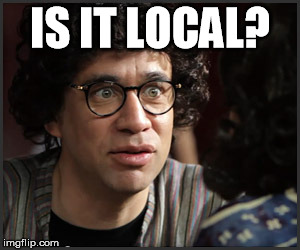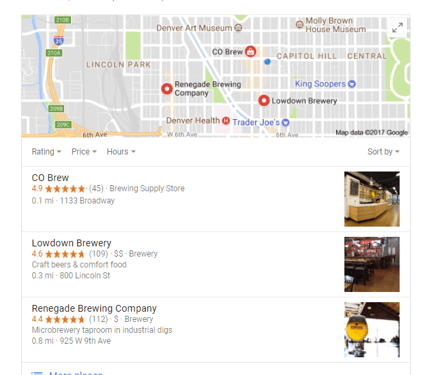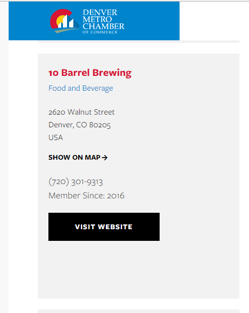Top Five Ways to Optimize for Local SEO

When you hear the words SEO, you probably think organic traffic rankings, keyword strategies, XML sitemaps, and blogging. But these buzzwords are by and large related to moving the needle across the whole world wide web. What about local SEO?

How do you improve your local SEO to keep up with your competitors?
Let's use an example of a business we see a lot here in Denver - breweries - to outline the steps you'll need to take to get you on the local SEO map (literally).
1. Claim Your Company's Google My Business Page
Claiming your Google My Business page is probably the most important step you can take to improving your local organic search presence.
Even though your website may be optimized and producing great content, without a Google My Business page, many people may not be able to find you on the local pack from the same searches that you may be ranking for.
The local pack is a big part of local SEO on Google searches. For searches from phones, or anywhere else GPS can be activated, the local pack appears above most organic results and features reviews and other details that convince users you're the company to go to in the area for whatever the product or service the search is related too. Google just recently cut down default local pack results from 7 to 3, but this shouldn't discourage you from optimizing as placement here can happen on hundreds of searches.

To claim your GMB page, navigate to https://www.google.com/business/, enter your physical address and Google will send you a postcard with a confirmation code to verify in the portal. Once the portal is set up, be sure to add as many details as possible such as address, services/products available, business description, and hours.
Great, you're on the map! What's next?
2. Reviews, Reviews, Reviews
Google My Business puts you on the local pack, but reviews help you climb up the rankings.
Encouraging your customers to leave you Google reviews after they visit you/use your service is a smart move to increase both your reputation and your local SEO presence.
And it doesn't stop with Google, positive reviews on channels like Yelp or YellowPages help you draw in users who use those websites, which are search engines in of themselves.
If reviews are hard to come by, consider drawing up an email that re-engages your customers to leave feedback. You can even throw in a small discount or gift card in exchange for their honest reviews. Don't pay for fake reviews - that's a no-no.
3. Get Listed on As Many Local Directories as Possible
Although Yelp and Google are the big boys for local results, any directory related to your location or industry that has an online presence would be great to have a link on.
If they are visited and shared enough on the web, they have what is called a high domain authority - basically a reputation meter for organic searches. Getting links on websites with high domain authorities passes some of that "juice" on to your website and helps you optimize for local organic searches outside the pack, which get used just as much as the local pack, believe it or not.
Examples of local directory websites are a town's Patch, rotary/Lion's Club listings, and chamber of commerce sites.

Do not, and I repeat, do not pay for directory listings. This is also another big no-no in Google's eyes.
4. Optimize SEO Elements on Your Website
Title tags, meta descriptions, H1s, blah, blah, blah. You've probably optimized these at least three times - and you generally should switch things up every 6 months or so - but take a fresh look with local SEO in mind.
Do your title tags have your location in them? How about your headers on your interior pages? Do you have your images alt tagged like "denver brewery?"
Putting the location or "near me" in SEO elements on all of your pages will give you a nice little boost for locally-related keywords.
5. Produce Great Local Content
Notice how I didn't say blogs here, but content.
Although blogging around locally relevant topics such as "Top Denver Food Trucks That Serve Breweries" or "Denver Dark Beers: Our Favorites" is certainly a recommended strategy in getting more local-friendly SEO-optimized content on your site, limiting yourself to blogs is a missed opportunity.
For example, creating local pages for your services or products is a great way to create highly-relevant landing pages for people's organic location-specific searches. A page on Denver Brewery Beers showcasing the latest and greatest of your hand-crafted creations would draw great traffic.
By the same logic, you might be compelled to create individual pages for all your beers - Denver Brewery IPAs, Denver Brewery Goses, Denver Brewery Stouts. While these would probably rank well organically, you always have to take user experience into consideration. Would a user be better served by one page that lists all your beers or pages that list them out individually? You know the answer here.
There you have it, that's how you begin to rank locally for organic traffic results. Looking to get even more organic traffic results from your website? Contact us today for a free SEO consultation.

October 2, 2017
